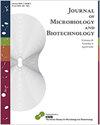发酵柠檬酸乳杆菌 SLAM 216 衍生的细胞外小泡可促进小鼠类器官模型的肠道成熟。
IF 2.5
4区 生物学
Q3 BIOTECHNOLOGY & APPLIED MICROBIOLOGY
引用次数: 0
摘要
摄入足量的益生菌可以促进宿主的健康,并有益地调节宿主的免疫力。特别是在宿主生命的早期,肠道经历了上皮成熟期,上皮细胞组织成特定的隐窝和绒毛结构。这一过程可由肠道微生物群介导。最近有研究报告称,服用益生菌可进一步促进新生儿肠道的成熟。因此,在本研究中,我们利用小鼠小肠器官组织研究了从发酵乳杆菌 SLAM 216 菌株中提取的胞外囊泡对肠道上皮成熟和稳态的影响。根据我们的研究结果,用 L. fermentum SLAM 216 衍生的 LF216EV(LF216EV)处理可显著增加类器官芽的数量和大小。此外,细胞外囊泡(EV)处理可上调成熟相关基因的表达,包括Ascl2、Ephb2、Lgr5和Sox9。众所周知,紧密连接在肠道免疫屏障中起着重要作用,而EV处理能显著提高与紧密连接相关的基因(如Claudin、Muc2、Occludin和Zo-1)的表达,这表明EV能促进肠道发育。RNA 测序也证明了这一点,测序结果显示与 cAMP 介导的信号转导相关的基因上调,而 cAMP 介导的信号转导已知可调控包括细胞分化在内的细胞过程。此外,暴露于 LF216EV 的器官组织显示出与维持大脑记忆和神经传导相关的基因上调,这表明其未来可能具有功能性影响。本文章由计算机程序翻译,如有差异,请以英文原文为准。
Limosilactobacillus fermentum SLAM 216- Derived Extracellular Vesicles Promote Intestinal Maturation in Mouse Organoid Models.
Probiotics, when consumed in adequate amounts, can promote the health of the host and beneficially modulate the host's immunity. Particularly during the host's early life, the gut intestine undergoes a period of epithelial maturation in which epithelial cells organize into specific crypt and villus structures. This process can be mediated by the gut microbiota. Recent studies have reported that the administration of probiotics can further promote intestinal maturation in the neonatal intestine. Therefore, in this study, we investigated the effects of extracellular vesicles derived from the Limosilactobacillus fermentum SLAM 216 strain, which is an established probiotic with known immune and anti-aging effects on intestinal epithelial maturation and homeostasis, using mouse small intestinal organoids. As per our findings, treatment with L. fermentum SLAM 216-derived LF216EV (LF216EV) has significantly increased the bud number and size of organoid buds. Furthermore, extracellular vesicle (EV) treatment upregulated the expression of maturation-related genes, including Ascl2, Ephb2, Lgr5, and Sox9. Tight junctions are known to have an important role in the intestinal immune barrier, and EV treatment has significantly increased the expression of genes associated with tight junctions, such as Claudin, Muc2, Occludin, and Zo-1, indicating that it can promote intestinal development. This was supported by RNA sequencing, which revealed the upregulation of genes associated with cAMP-mediated signaling, which is known to regulate cellular processes including cell differentiation. Additionally, organoids exposed to LF216EV exhibited upregulation of genes associated with maintaining brain memory and neurotransmission, suggesting possible future functional implications.
求助全文
通过发布文献求助,成功后即可免费获取论文全文。
去求助
来源期刊

Journal of microbiology and biotechnology
BIOTECHNOLOGY & APPLIED MICROBIOLOGY-MICROBIOLOGY
CiteScore
5.50
自引率
3.60%
发文量
151
审稿时长
2 months
期刊介绍:
The Journal of Microbiology and Biotechnology (JMB) is a monthly international journal devoted to the advancement and dissemination of scientific knowledge pertaining to microbiology, biotechnology, and related academic disciplines. It covers various scientific and technological aspects of Molecular and Cellular Microbiology, Environmental Microbiology and Biotechnology, Food Biotechnology, and Biotechnology and Bioengineering (subcategories are listed below). Launched in March 1991, the JMB is published by the Korean Society for Microbiology and Biotechnology (KMB) and distributed worldwide.
 求助内容:
求助内容: 应助结果提醒方式:
应助结果提醒方式:


